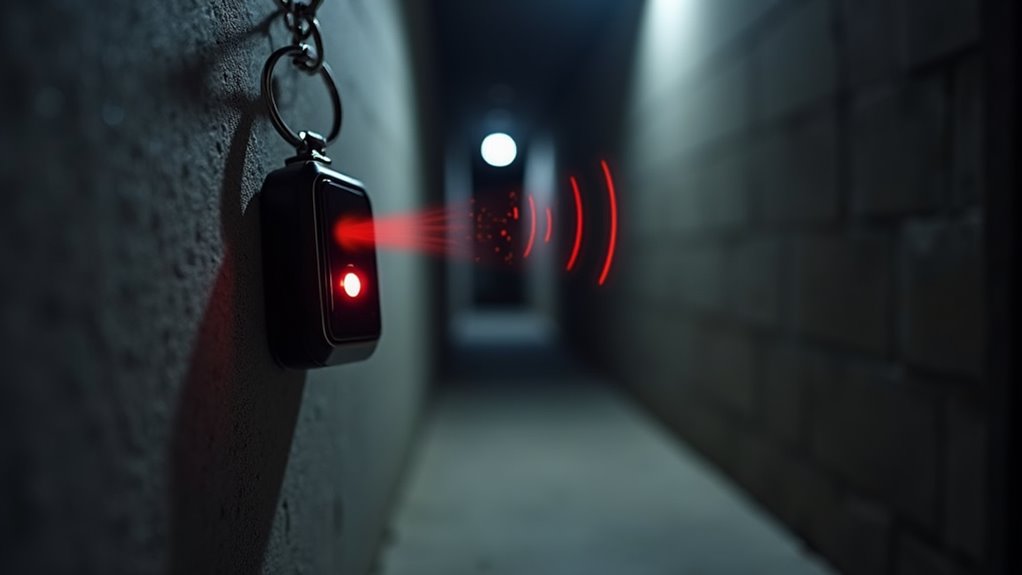A personal alarm gives you instant protection with its piercing 120-130 dB sound that disorients attackers and alerts nearby people up to 1,000 feet away. You’ll have peace of mind knowing your alarm can summon help with one button press, sending GPS coordinates to emergency services and contacts. The alarm’s powerful blast creates an immediate community response network while giving you precious moments to escape danger. There’s much more to discover about this essential self-defense tool‘s capabilities.
Instant Emergency Notification Capability

A personal alarm can protect you in multiple ways by disorienting attackers with its piercing sound, which gives you vital moments to escape from dangerous situations. You’ll find that the alarm’s loud blast instantly alerts anyone within earshot, including neighbors, pedestrians, and nearby security personnel who can rush to help. When you’re in trouble, you can count on your personal alarm to quickly trigger an emergency response, as its distinctive sound signals clear distress and prompts others to call authorities right away. The 2n1 Personal Burglar Alarm is particularly effective, emitting a 120 dB sound that ensures immediate attention in emergencies. The 3in1 130db Personal Alarm With Light offers additional functionality, including a flashlight and a strobe light that activates when the alarm is triggered, enhancing its effectiveness in attracting help.
Disorients Approaching Attackers Immediately
When faced with a threatening situation, personal alarms provide an immediate and powerful defense by emitting an ear-piercing sound that can disorient and startle potential attackers.
As part of your self defense tactics, you’ll find that these devices create a sudden, high-decibel noise that makes it difficult for attackers to maintain focus or continue their approach.
The disorienting effect isn’t just about volume – it’s about creating an unexpected disruption that buys you precious time to escape.
Your personal safety depends on those vital first moments when an attacker might be considering their next move. The alarm’s piercing sound can cause them to cover their ears, step back, or even run away, giving you the opportunity to seek help or move to a safer location.
Alerts Nearby People Instantly
Beyond disorienting attackers, personal alarms serve another powerful purpose – they instantly grab the attention of anyone within earshot.
When you’re in a threatening situation, you’ll want to alert as many people as possible, and these devices can reach distances of up to 1,000 feet, making them incredibly effective at creating community awareness.
The piercing sound of your personal alarm will cause nearby pedestrians, shopkeepers, and residents to immediately take notice and investigate what’s happening.
You’re fundamentally creating an instant network of potential helpers who can call authorities or intervene directly.
In areas where you might feel vulnerable, like parking lots or quiet streets, knowing you can instantly alert others adds an extra layer of personal safety that’s truly invaluable.
It’s like having a crowd of witnesses at your fingertips.
Activates Emergency Response Fast
Since every second counts in an emergency, personal alarms equipped with instant notification features can dramatically speed up response times from police, medical services, and other first responders.
Today’s advanced safety devices can automatically send your exact location and emergency details to authorities, which means you won’t have to waste precious time explaining where you’re or what’s happening.
When you activate your personal alarm’s emergency response feature, here’s what typically happens:
- Your device immediately sends GPS coordinates to local emergency services
- It transmits important medical information you’ve pre-loaded, like allergies or conditions
- The system automatically alerts your designated emergency contacts, keeping them informed of your situation
You’ll feel more confident knowing that help is just one button press away, with a network of responders ready to assist you.
Batteries Require Regular Testing
Because personal alarms rely on battery power to function properly, you’ll need to check them regularly to verify they’re ready when you need them most. The battery lifespan of most personal alarms ranges from six months to a year, but it’s smart to test yours monthly as part of your basic alarm maintenance routine. When you’re testing your alarm’s batteries, you’ll want to press the activation button briefly to confirm it produces a loud, clear sound. If you notice the sound is weak or inconsistent, don’t wait – replace the batteries immediately. Personal security alarms emit up to 130dB sound, making them an effective self-defense tool. It’s also a good idea to keep spare batteries on hand, especially if you’re planning to travel or spend time in unfamiliar areas where finding replacements might be challenging.
Monthly Battery Check Schedule

A monthly battery check schedule helps you stay on top of your personal alarm’s power needs.
You’ll want to mark your calendar for the first day of each month, making it as routine as paying your bills or checking your smoke detectors. Testing frequency is essential because you don’t want to discover a dead battery during an emergency when you need your alarm most.
To maximize battery life, you should perform a quick 30-second test by pressing and holding the alarm button, listening for a strong, clear sound that doesn’t waver or sound weak.
If you notice any changes in volume or tone, it’s time to replace the batteries immediately.
Don’t forget to keep spare batteries handy, storing them in a cool, dry place where you can easily find them.
Check Pull-Cord Wear Level
While inspecting your personal alarm’s pull-cord might seem like a minor task, regular checks can mean the difference between safety and vulnerability in an emergency.
You’ll want to examine your pull cord maintenance schedule and perform a thorough wear assessment at least once every two weeks, looking for signs of fraying, discoloration, or weak spots along the cord’s length.
When you’re checking the cord, gently tug it from different angles to verify it’s still firmly attached to the alarm unit and hasn’t become loose or weakened at the connection point.
If you notice any concerning changes in the cord’s texture or thickness, don’t take chances – replace it immediately.
Answers to Common Questions
How Loud Is a Personal Alarm Compared to a Car Alarm?
You’ll find personal alarms are typically louder than car alarms, reaching up to 140 decibels compared to a car alarm’s 110-120 decibels. This loudness comparison offers greater safety benefits in emergency situations.
Can Personal Alarms Be Taken on Airplanes?
You’ll breeze through airport security with a personal alarm – just kidding! While regulations generally allow them, it’s smart to check your specific airline’s rules. TSA typically permits personal alarms in carry-on and checked bags.
What Is the Average Range of a Personal Alarm Sound?
You’ll find most personal alarms have a sound intensity range of 100-140 decibels that can be heard up to 300-1000 feet away. The alarm effectiveness generally depends on environmental conditions and battery strength.
Are Personal Alarms Legal in All States?
You’ll find personal alarms are legal in all states, as they don’t face state regulations like pepper spray or tasers do. However, it’s wise to check specific local laws if you’re entering restricted areas.
Do Personal Alarms Work Effectively Underwater or in Rainy Conditions?
While you’re safe from sharks underwater, your personal alarm won’t help you there. Most alarms aren’t waterproof, but they’ll work fine in light rain – just don’t submerge them or expose them to heavy downpours.
Bottom Line
You’ll never regret carrying a personal alarm, especially considering that 83% of surveyed assault survivors credit their alarms with deterring or stopping an attack. By keeping your device well-maintained with regular battery checks and cord inspections, you’re taking a smart, proactive step toward personal safety. Don’t wait until you need it – make your personal alarm an essential part of your daily routine, just like your keys and phone.




